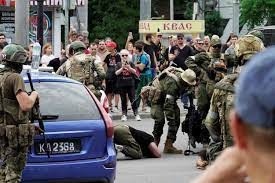
Yevgeny Prigozhin, the Wagner Group’s leader, launched an uprising in less than 24 hours by dispatching troops to Rostov in the south and then on to Moscow.Rarely do Wagner warriors speak to the media, but BBC Russian spoke to a young commander who was caught up in the fighting.
Gleb—not his real name—had previously taken part in the conflict over the important Ukrainian town of Bakhmut. He was taking a break with his regiment in a barracks in the Russian-occupied Luhansk region when the mutiny started.
On June 23, they received a call telling them to join a column of Wagner fighters departing Ukraine. For security concerns, Gleb is hesitant to identify the Wagner commander who gave the order, although they were following Prigozhin’s and the Wagner Command Council’s instructions.
He was told, “It’s a full deployment.” “Let’s leave; we’re forming a column.”
Nobody was told where the column was going, according to Gleb, so he was taken aback when he realized they were retreating from the front lines.
He claims that as they passed the Russian border into the Rostov region, the Wagner fighters met with zero resistance.
He recalls, “I didn’t see any border guards.” However, the passing traffic officers saluted us.
Later, Wagner-affiliated Telegram channels asserted that border guards at the Bugayevka crossing had put their rifles down as the Wagner warriors arrived.These channels posted a picture that appeared to be from the scene and showed two dozen armedless people dressed in concealment.
The fighters were instructed to encircle all Rostov-on-Don police stations and take over the military airport as they reached the city. The Federal Security Service (FSB) regional offices should be taken under control by Gleb’s unit.
The building appeared to be entirely locked and deserted when they got closer. To look for any indications of life, they flew a drone overhead.
After 30 minutes, a door finally opened, and two people emerged onto the street.
Guys, let’s make a deal, they said, according to Gleb. “I questioned, ‘What’s there to negotiate about? This is where we live.
We simply decided to respect each other’s privacy. They occasionally came outside to smoke.
A similar circumstance involving numerous government buildings in and around the city has been reported by Rostov media. Drones would be flown over them by the Wagner fighters before they were surrounded. No one was allowed to leave, although delivery men with food were permitted entry.
While all of this was going on, Wagner leader Prigozhin was meeting with Lt Gen Yunus-bek Yevkurov, Russia’s deputy defense minister, and Lt Gen Vladimir Alexeyev, Russia’s deputy chief of the general staff, at the Southern Military District headquarters of the Russian army.
Valery Gerasimov, the head of the general staff, and Sergei Shoigu, the minister of defense, had to be turned over, according to Prigozhin.
There was another column of Wagner fighters moving while Prigozhin was in his meeting.
Gleb verifies media claims that this piece was overseen by former special forces officer and Wagner creator Dmitry Utkin, who is not frequently seen in public.
He claims that this column was on the main road leading to Voronezh and was seemingly headed for Moscow.
So, did Gleb know Prigozhin’s strategy or what he had planned to do?
He professes to be clueless while yelling profanities. “Like you, we found out what was going on from Telegram.”
As the day wore on, images of the events in Rostov were broadcast all over the world. People were shocked to witness locals, including local journalists, interacting with some of the traditionally secretive Wagner warriors invading their city while appearing to smile and laugh.
Gleb claims, “It was the ex-cons,” alluding to the numerous serving inmates or convicted felons drafted into Wagner last year. Nobody warned them not go, and no one is concerned about them.
The regulations are considerably better known by experienced fighters like Gleb who were hired before the Ukraine War.
On the evening of June 24, Gleb received a call from one of his supervisors informing him that his squad should immediately return to their base in Luhansk.
They were monitoring the news on Telegram as they made their way back to the barracks.
They learned that Prigozhin had faced criminal charges before they were later dropped and that he would be relocating to Belarus.
Then they read that Dmitry Peskov, the spokesman for President Putin, claimed that Wagner warriors would not be held liable for their involvement in the mutiny due to their “combat merits.”
The future of Gleb and his squad is currently up in the air. They have been instructed to remain in their Luhansk barracks and wait for further instructions.
Their hosts, the pro-Russian separatist fighters running the so-called Luhansk People’s Republic in eastern Ukraine, are eager to learn more about their future plans and what will happen to their supplies, he claims.
Gleb gives a straightforward response when asked why he stays with Wagner: “My contract hasn’t expired yet.”


Share your thoughts